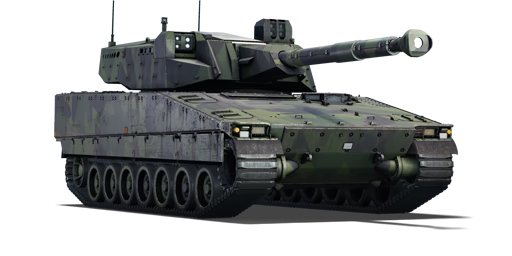


The CV90105 light tank was first publicly revealed in 2014. It was jointly developed by CMI Defence and BAE Systems Hagglunds. It was based on the CV90 IFV chassis, which was already combat proven and served with many countries. It used a Belgian Cockerill XC-8 lightweight concept turret, that was already present in the CT-CV 105HP. The concept was also related to the CV 90120, that used the same CV90 chassis and the turret from the AMX-10RC. The tank featured a stabilized 105 mm cannon, with an autoloader and it was meant to be operated in mountainous and urban terrain. An upgraded turret with a 120 mm cannon was proposed by CMI Defence, in order to increase firepower against other main battle tanks.
It was originally introduced as the "CV 90105 TML" in Update 1.97 "Viking Fury" with a Nexter low-profile turret and a similar 105 mm low-recoil cannon, but was almost completely remodelled in Update "Drone Age". The CV 90105 is a very powerful light tank. It features a decent armament, and while a 105 mm cannon can be considered underpowered at a BR where most MBTs use 120 mm guns, the CV90105 compensates this with excellent fire control systems. With 2nd generation thermal imaging systems as well as a stabilized commander sight (with its own thermal sight). It also has very decent armour for a light tank, and from the front the crew is very well protected against HEAT warheads and autocannon fire, even from 57 mm autocannons. The mobility is also very good, and it has access to an excellent reverse speed, so it can escape from enemies or change position with ease in the heat of battle.
| Ammunition | Type | Armor penetration (mm) at a distance: | |||||
|---|---|---|---|---|---|---|---|
| 10 m | 100 m | 500 m | 1000 m | 1500 m | 2000 m | ||
| HEATFS | 400 | 400 | 400 | 400 | 400 | 400 | |
| Smoke | 3 | 3 | 3 | 3 | 3 | 3 | |
| HESH | 127 | 127 | 127 | 127 | 127 | 127 | |
| APFSDS | 338 | 336 | 330 | 323 | 315 | 307 | |
| APFSDS | 421 | 419 | 411 | 401 | 391 | 381 | |
| ATGM (tandem) | 550 | 550 | 550 | 550 | 550 | 550 | |
| Belt | Belt filling | Armor penetration (mm) at a distance: | |||||
|---|---|---|---|---|---|---|---|
| 10 m | 100 m | 500 m | 1000 m | 1500 m | 2000 m | ||
| AP/T | 13 | 12 | 7 | 3 | 2 | 0 | |







 2 x (140 / 175 / 220) %
2 x (140 / 175 / 220) % 
 2 x 232 %
2 x 232 % 

Mobility | |
|---|---|
Protection |
|---|
Firepower | |||
|---|---|---|---|